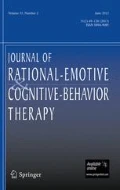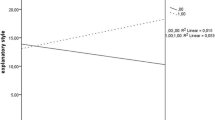Abstract
Rational-emotive behavior therapy (REBT; Ellis, 1995) contends that esteeming oneself—favorably or unfavorably—is illogical (implying an objective basis for evaluating global worth) and counterproductive (making one prone to depression in the wake of setbacks, anxiety otherwise). A healthier outlook requires unconditional self-acceptance (USA). We evaluated predictions regarding USA in a nonclinical university student sample. Consistent with REBT, participants scoring high on a USA questionnaire, controlling for self-esteem level, reported being low in proneness to depression and in self-esteem lability. They also were more objective in evaluating their performance on a public speaking task and were less apt to denigrate people who provided negative evaluations of their speeches. Predictions regarding impression management, willingness to try another speech, and mood or state self-esteem reactivity to feedback were not supported. Discussion focused on implications for research on USA as well as applied implications for therapy or prevention programs.
Similar content being viewed by others
REFERENCES
Aiken, L. S., & West, S. G. (1991). Multiple regression: Testing and interpreting interactions. Newbury Park, CA: Sage Publications.
Alloy, L. B., Hartlage, S., Metalsky, G. I., & Abramson, L. Y. (1987). The Depression Proneness Inventory: A brief, face-valid scale of vulnerability to depressive reactions in response to stress. Unpublished manuscript, Temple University.
Baumeister, R. F., Smart, L., & Boden J.M. (1996). Relation of threatened egotism to violence and aggression: The dark side of high self-esteem. Psychological Review, 103, 5–33.
Chamberlain, J. M., & Haaga, D. A. F. (2001). Unconditional self-acceptance and psychological health. Journal of Rational-Emotive & Cognitive-Behavior Therapy, 19, 163–176.
Dykman, B. (1998). Integrating cognitive and motivational factors in depression: Initial tests of a goal-orientation approach. Journal of Personality and Social Psychology, 74, 139–158.
Ellis, A. (1973). Humanistic psychotherapy: The rational-emotive approach. New York: Julian.
Ellis, A. (1976). RET abolishes most of the human ego. Psychotherapy: Theory, Research, and Practice, 13, 343–348.
Ellis, A. (1977). Psychotherapy and the value of a human being. In A. Ellis & R. Grieger (Eds.), Handbook of rational-emotive therapy (pp. 99–112). New York: Springer.
Ellis, A., & Bernard, M. E. (1985). What is rational-emotive therapy (RET)? In A. Ellis and M.E. Bernard (Eds.), Clinical applications of rational emotive therapy (pp. 1–30). New York: Plenum.
Ellis, A., & Dryden, W. (1997). The practice of rational emotive behavior therapy (2nd Ed.). New York: Springer.
Ellis, A., & Harper, R. A. (1997). A guide to rational living (3rd Ed.). North Hollywood, CA: Wilshire.
Engels, G. I., Garnefski, N., & Diekstra, R. F. W. (1993). Efficacy of rationalemotive therapy; A quantitative analysis. Journal of Consulting and Clinical Psychology, 61, 1083–1090.
Greenier, K. D., Kernis, M. H., McNamara, C. W., Waschull, S. B., Berry, A. J., Herlocker, C. E., & Abend, T. A. (1999). Individual differences in reactivity to daily events: Examining the roles of stability and level of selfesteem. Journal of Personality, 67, 185–208.
Heatherton, T. F., & Polivy, J. (1991). Development and validation of a scale for measuring state self-esteem. Journal of Personality and Social Psychology, 60, 895–910.
Kernis, M. H., Cornell, D. P., Sun, C., Berry, A., & Harlow, T. (1993). There's more to self-esteem than whether it is high or low: The importance of stability of self-esteem. Journal of Personality and Social Psychology, 65, 1190–1204.
Kernis, M. H., Grannemann, B. D., & Barclay, L. C. (1992). Stability of selfesteem: Assessment, correlates, and excuse making. Journal of Personality, 60, 621–644.
Paulhus, D. L. (1984). Two-component models of socially desirable responding. Journal of Personality and Social Psychology, 46, 598–609.
Robinson, J. P., & Shaver, P. R. (1973). Measures of social psychological attitudes. Ann Arbor, MI: Institute for Social Research.
Rogers, C. R. (1961). On becoming a person: A therapist's view of psychotherapy. Boston: Houghton Mifflin.
Rosenberg, M. (1965). Society and the adolescent self-image. Princeton, NJ: Princeton University Press.
Sackeim, H. A., & Gur, R. C. (1978). Self-deception, self-confrontation, and consciousness. In G. E. Schwartz and D. Shapiro (Eds.), Consciousness and self-regulation: Advances in research (Vol. 2, pp. 139–197). New York: Plenum Press.
Schlenker, B. R., Soraci, S., & McCarthy, B. (1976). Self-esteem and group performance as determinants of egocentric perceptions in cooperative groups. Human Relations, 29, 1163–1176.
Tarlow, E. M., & Haaga, D. A. F. (1996). Negative self-concept: Specificity todepressive symptoms and relation to positive and negative affectivity.Journal of Research in Personality, 30, 120–127.
Author information
Authors and Affiliations
Rights and permissions
About this article
Cite this article
Chamberlain, J.M., Haaga, D.A.F. Unconditional Self-Acceptance and Responses to Negative Feedback. Journal of Rational-Emotive & Cognitive-Behavior Therapy 19, 177–189 (2001). https://doi.org/10.1023/A:1011141500670
Issue Date:
DOI: https://doi.org/10.1023/A:1011141500670




